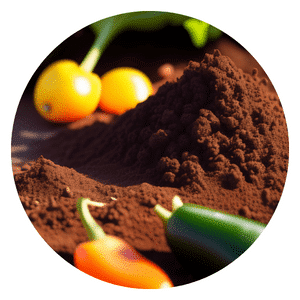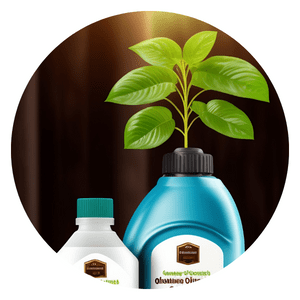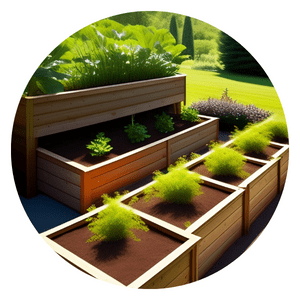Organic Fennel Gardening Guide
🌱🌿 Hey there, fellow green thumbs and fennel fanatics!
Chappy the Gardener here, ready to take you on a flavorful journey through the world of organic fennel growing! 🌿🌱
Are you ready to spice up your gardening game and enjoy the sweet and aromatic goodness of homegrown fennel?
Look no further because I’ve got the ultimate step-by-step guide to turn your garden into a fennel wonderland!
So, grab your gardening gloves and let’s dig into the secrets of cultivating this fantastic herb together! 🌿👨🌾🍴

Fennel Gardening Menu
Choose the Right Location
When it comes to growing organic fennel, selecting the right location in your garden is essential for its success.
Fennel loves basking in the warm sunlight, so make sure to choose a spot that receives at least six hours of direct sunlight per day.
A sunny location not only helps promote healthy growth but also enhances the vibrant flavors of your fennel bulbs. So, keep an eye out for those sunny spots and utilize them wisely!
In addition to sun exposure, paying attention to soil quality is equally important.
Optimal growth requires well-draining soil with a pH level ranging between 6.0 and 7.0 for fennel plants.
By providing adequate drainage and maintaining a slightly acidic pH balance, you create an ideal environment for strong root development and nutrient absorption.
It’s worth remembering that fennel’s taste is greatly influenced by its growing conditions, so a proper location with suitable soil characteristics can truly elevate your homegrown harvest.
Remember that finding the perfect spot may require some experimentation and observation in different areas of your garden before settling on the ideal location for planting organic fennel.
Don’t be discouraged if it takes a few tries; gardening is all about learning and adapting as you go along.
Trust me – when you finally discover that sunny corner with well-draining soil where your lovely fennel plants thrive, the rewards will be worth every bit of effort!
Start with Organic Seeds
Organic seeds not only provide the foundation for a vibrant garden but also contribute to the overall sustainability of your gardening practices.
By selecting organic seeds, you are supporting environmentally friendly farming methods and reducing the reliance on synthetic pesticides and fertilizers.
When starting with organic fennel seeds, it is vital to choose varieties that are well-suited to your specific growing conditions.
Consider factors like climate, soil type, and desired culinary use when selecting your seed varieties.
Different fennel varieties offer unique flavors and textures, such as crisp bulbs or feathery fronds perfect for seasoning dishes or brewing aromatic teas.
By choosing high-quality organic seeds, you lay the groundwork for a successful fennel garden that provides an abundance of flavorful harvests year after year.
Not only does this approach promote biodiversity and ecological health in your local environment, but it also allows you to savor the unbeatable taste of organically grown fennel – crisp, aromatic bulbs bursting with natural goodness. So why wait?
Join the movement towards sustainable gardening practices by starting your organic fennel journey with top-notch organic seeds today!
Germinate Indoors
Germinating fennel seeds indoors is a great technique for ensuring a head start on your fennel garden.
By starting the germination process before the last frost, you can multiply your chances of success and give your fennel plants a longer growing season.
Seed trays are an excellent option for germinating fennel seeds as they provide the perfect environment for seeds to sprout and develop into young seedlings.
One of the main advantages of germinating fennel seeds indoors is that it gives you better control over temperature, light, and moisture levels.
You can carefully monitor these factors to create optimal conditions for seed germination. This control also helps protect your young seedlings from potential adverse weather conditions such as late spring frosts or heavy rains that could harm them if they were directly sowed outside.
Furthermore, indoor germination allows you to prepare strong and healthy seedlings before transplanting them outdoors.
During this crucial period in their early growth stages, you can ensure they receive adequate nutrition by using high-quality organic potting soil and providing gentle watering routines. This attention to detail in the germination phase lays the foundation for robust fennel plants with strong root systems that will thrive once transplanted outside after the last frost.
Germinating fennel seeds indoors not only gives you a head start but also provides an opportunity to cultivate stronger seedlings ready for successful transplantation into your outdoor garden.
In earth's embrace, where green wonders reside, A guide to fennel's growth, as herbs collide. Step by step, these pages unfurl the way, To nurture organic life, day by day. Through soil's tenderness and sunlit kisses, Fennel blooms, enchanting with fragrant blisses. With care and love, this garden we pursue, A symphony of flavors, organically true.
Chappy The Gardener
Thin Seedlings
Thin Seedlings: Once the fennel seedlings are about 3 inches tall, it’s time to thin them out. This crucial step in fennel gardening ensures that each plant has ample space for proper growth and development.
By spacing them about 12 to 18 inches apart, you are giving them enough room to spread their roots and grow into healthy, vibrant plants.
Thinning seedlings may require some tough decision making, as it means removing some of your hard-earned sprouts from the ground.
However, the benefits far outweigh any temporary sadness.
Thinning allows the remaining plants to receive sufficient sunlight, nutrients, and water without competing with each other for resources. This reduces the risk of diseases caused by overcrowding and encourages strong root development.
Furthermore, thinning also gives you an opportunity to select the strongest seedlings for continued growth.
By removing weaker or damaged plants early on, you’re ensuring that only the healthiest ones thrive in your garden. It’s a bit like nature’s way of encouraging survival of the fittest!
So don’t be afraid to edit your fennel patch – it will result in a more productive and visually appealing garden in the long run.
Thinning seedlings is not just about creating more space; it’s also about fostering healthier plants through natural selection.
By giving your fennel seedlings adequate room to grow, you’re setting them up for success as they reach maturity.
Companion Planting
Companion planting is a time-tested gardening technique that involves planting different species of plants in close proximity to one another for mutual benefit.
When it comes to fennel, choosing the right companions can make all the difference in promoting a healthy and thriving garden ecosystem.
By planting fennel alongside beneficial companions like dill, chamomile, and marigolds, you not only increase biodiversity but also deter pests naturally.
Dill is an excellent companion for fennel as it helps repel pests such as aphids and spider mites.
Moreover, its airy foliage allows sunlight to reach the base of the fennel plant without creating overshadowing issues.
Chamomile provides much-needed nectar for pollinators while suppressing harmful weeds around your fennel patch.
Additionally, chamomile’s delicate fragrance helps mask any potent smells emitted by the fennel plant.
Lastly, marigolds are known for their ability to repel nematodes and other damaging insects when planted near fennel. Their bright orange or yellow flowers add a stunning pop of color to your garden while serving as a natural pest deterrent.
By incorporating these beneficial companion plants into your garden alongside fennel, you can create a harmonious ecosystem where each species supports and benefits from one another’s presence.
Not only will this encourage healthier growth and higher yields but it will also minimize the need for chemical pesticides or harmful interventions in your organic gardening journey.
Mulch for Moisture
One of the key factors in maintaining a healthy fennel plant is ensuring it receives enough moisture.
By applying organic mulch around your fennel plants, you can help retain soil moisture and keep them thriving.
Mulch acts as a protective barrier, preventing evaporation and reducing water loss from the soil.
Not only does this conserve water, but it also creates an optimal environment for your fennel to grow.
Another benefit of using organic mulch is its ability to suppress weed growth.
Weeds compete with fennel for nutrients, water, and sunlight, which can hinder their growth and development.
By keeping weeds at bay with a layer of organic mulch, you provide your fennel plants with the space they need to flourish without competition from unwanted vegetation.
When choosing the best type of organic mulch for your fennel plants, opt for materials such as straw, wood chips, or shredded leaves.
Avoid using synthetic materials that may contain harmful chemicals or dyes that could leach into the soil over time.
Applying two to three inches of mulch around each fennel plant will ensure sufficient coverage while allowing air circulation to avoid rotting beneath the surface.
So next time you’re tending to your garden and caring for your beloved fennels, remember the power of organic mulch in retaining moisture and suppressing weeds. This simple step will keep your fennels happy and healthy throughout their growing season.
Consistent Watering
Consistent watering is crucial for the successful cultivation of fennel. This aromatic herb demands regular moisture, especially during dry spells.
Providing your fennel plants with adequate hydration ensures optimal growth and development.
Without sufficient water, fennel can become weak and prone to diseases. Additionally, consistent watering helps the plant retain its rich flavor and promotes a crisp texture.
However, it’s essential to strike a balance with your watering routine.
Overwatering can have detrimental effects on the health of your fennel plants as it may lead to root rot.
When water accumulates around the roots for an extended period, oxygen supply gets disrupted, causing decay and eventually killing the plant.
To avoid this issue, make sure that there is proper drainage in place for excess water to escape.
By understanding and implementing a consistent watering schedule for your fennel garden, you will be able to create an ideal environment for these flavorful herbs to thrive.
Remember that every situation is unique— factors such as climate and soil type determine how frequently you should water your plants.
So keep an eye on weather forecasts and monitor the moisture levels in your soil regularly to ensure that you strike just the right balance between keeping your fennel hydrated without risking root rot’s deadly consequences.
Consistently providing water to your fennel plants is vital for their well-being but requires careful attention.
Organic Fertilization
Organic fertilization is the key to a thriving fennel garden.
By feeding your fennel plants with organic compost or well-rotted manure, you not only enrich the soil with essential nutrients but also promote overall soil health. These natural fertilizers provide a balanced blend of macro and micronutrients that are necessary for robust growth and flavor development in fennel.
Using organic compost or well-rotted manure ensures that your plants receive a slow release of nutrients over time, reducing the risk of nutrient imbalance or burning the delicate root system. This gradual nutrient release also helps improve soil structure and moisture retention, creating an optimal growing environment for fennel.
Additionally, organic fertilizers contribute to building up beneficial microorganisms in the soil, enhancing its fertility and resilience.
To feed your fennel plants with organic fertilizer, simply work it into the top few inches of soil around each plant.
For best results, apply the fertilizer before planting or during early spring when new growth is just emerging.
Remember to water thoroughly after application to help activate the nutrients and prevent any potential salt buildup.
Give your fennel garden a boost by incorporating organic fertilization into your gardening routine.
Not only will you be providing essential nutrients for healthy plant growth, but you’ll also be cultivating a sustainable and eco-friendly approach to gardening.
So grab some compost or well-rotted manure today and watch as your fennel plants flourish in abundance!
Harvest Bulbs
When it comes to harvesting fennel bulbs, timing is of the essence.
The ideal size for harvest is when the bulbs have reached about 3 to 4 inches in diameter.
At this stage, they are usually fully formed and have a crisp texture.
Harvesting too early may result in small immature bulbs, while waiting too long can lead to woody and tough bulbs.
To harvest fennel bulbs, start by cutting them at the base, just above ground level.
It’s important to leave a few inches of the stalk intact.
Not only does this help with handling during harvest, but it also allows for easier storage and prolongs the shelf life of the bulbs.
You can trim off any excess foliage before storing or using the harvested bulbs.
The process of harvesting fennel bulbs provides an opportunity to appreciate nature’s bounty as well as our role as caretakers of these plants.
As you hold each bulb in your hand, feel its weight and envision how it will contribute to your culinary creations.
Cutting away at the base symbolizes a connection with our ancestral farming practices and reminds us that we are partaking in a timeless tradition handed down through generations.
Save Seeds
Allowing some fennel plants to flower and produce seeds not only benefits your future plantings but also adds a flavorful twist to your culinary creations.
Fennel seeds are highly versatile in the kitchen, offering a unique aroma reminiscent of licorice with hints of sweetness and warmth.
By saving these precious seeds, you can ensure a continuous supply for future gardening endeavors and elevate the flavors in your dishes all year round.
To collect fennel seeds, simply let a few selected plants reach maturity and bolt into their flowering stage.
As the yellow blossoms fade away, small green seed pods will appear. It is essential to wait until these seed pods turn brown before harvesting them.
At this stage, the pods will easily split open, revealing the tiny aromatic seeds within.
Gently pluck these pods from the plant and place them in a paper bag or envelope for drying before storing them in an airtight container.
Having your own supply of fennel seeds allows you to experiment with different cuisines and infuse your meals with exotic flavors.
Add crushed fennel seeds to marinades or rubs for meat dishes, sprinkle them on roasted vegetables for additional depth of flavor, or brew them into herbal teas for digestive support. The possibilities are endless when it comes to utilizing these delightful little gems from your fennel garden.
So let some fennel plants go to seed – not only will they provide you with future plantings but also enhance your culinary adventures like never before!
Replant for Continual Harvest
One of the secrets to enjoying a continuous supply of fresh and flavorful fennel throughout the growing season is to replant new seedlings every few weeks.
While you may be tempted to plant all your fennel seedlings at once, spacing out your plantings ensures a steady harvest.
By doing so, you can enjoy crisp and tender bulbs from early spring all the way through fall.
Replanting new seedlings at regular intervals not only provides you with a constant supply of fennel but also helps to prevent overcrowding and competition among plants.
Fennel, particularly when matured, requires ample space for its bulbous roots to develop fully.
Planting in succession allows each fennel plant sufficient room to grow and thrive without encroaching upon its neighboring plants.
Moreover, replanting regularly offers an opportunity to fine-tune your gardening techniques and adapt to changing environmental conditions.
You can learn from previous experiences and make adjustments along the way in order to optimize growth conditions for your fennel crop.
Whether it’s adjusting watering schedules or experimenting with different soil amendments, this approach allows you to experiment and constantly improve your care practices for optimal success.
By adopting the practice of replanting new seedlings every few weeks throughout the growing season, gardeners can appreciate a continuous bounty of vibrant fennel that surpasses any limitations associated with planting everything at once.
Watch for Pests
Keeping a watchful eye for pests is an essential aspect of successful fennel gardening.
Two common culprits that can wreak havoc on your fennel plants are aphids and caterpillars.
Aphids, those tiny sap-sucking insects, can quickly multiply and infest your plants, causing stunted growth and distorted leaves.
On the other hand, caterpillars can voraciously munch on the foliage of your fennel plants, leaving unsightly holes behind.
To combat these pesky invaders, it’s best to turn to organic pest control methods.
Neem oil, derived from the neem tree’s seeds, is a popular choice among organic gardeners. This natural insecticide works by disrupting the pests’ life cycle and acts as a repellent.
Alternatively, insecticidal soap made from plant-based oils is another effective option to keep aphids and caterpillars at bay.
Embracing organic pest control not only protects your fennel crops but also ensures you’re growing in harmony with nature.
By using neem oil or insecticidal soap instead of synthetic pesticides, you maintain a balanced ecosystem in your garden that supports beneficial insects like ladybugs and lacewings – natural predators of aphids and caterpillars.
So next time you spot signs of these common pests on your fennel plants, remember to opt for eco-friendly solutions that safeguard both your harvests and the environment around you.
Disease Prevention
When it comes to growing organic fennel, disease prevention is a crucial aspect.
One common fungal disease that can affect your fennel plants is powdery mildew. This unsightly and damaging disease can quickly spread if not properly managed.
To prevent the occurrence of powdery mildew, it’s essential to provide good air circulation around your plants. This can be achieved by spacing them adequately apart and pruning any dense foliage that may hinder airflow.
Another important factor in preventing fungal diseases like powdery mildew is avoiding overhead watering.
Excessive moisture on the leaves and stems creates a favorable environment for fungal spores to multiply and thrive.
Instead, opt for drip irrigation or water at the base of the plant to keep the foliage dry.
By taking these precautions, you’ll significantly reduce the chances of powdery mildew affecting your organic fennel crop and ensure healthy growth throughout the growing season.
Remember, prevention is always better than cure when it comes to gardening organically!
Implementing these measures from an early stage will help establish a disease-resistant environment for your fennel plants.
With proper air circulation and careful watering practices, you’ll enjoy thriving fennel crops while keeping fungal diseases at bay.
So make sure to prioritize disease prevention in your organic fennel garden and reap the rewards of healthy harvests year after year!
Practice Crop Rotation
Crop rotation is a crucial practice in organic gardening that promotes soil health and reduces the risk of pest and disease infestations.
When it comes to fennel, rotating it with other vegetable families each year is especially beneficial.
Fennel belongs to the Umbelliferae family, which includes popular crops like carrots, celery, and parsley.
By rotating fennel with different families like Brassicas or Solanaceae, you can disrupt the life-cycle of soil-borne diseases that target specific plant families.
Regularly rotating fennel helps break pest and disease cycles by differentiating the plants grown in a particular area each season. It prevents excessive build-up of pathogens in the soil and decreases the likelihood of reoccurring outbreaks.
Additionally, planting different vegetable families in succession replenishes essential nutrients utilized by specific crops without depleting them over time. This ensures long-term fertility and productivity while maintaining a balanced ecosystem within your garden.
By practicing crop rotation with fennel, you not only reduce the risk of pests and diseases but also improve overall soil health in your garden. This technique allows you to enjoy healthy harvests while minimizing your reliance on synthetic fertilizers or pesticides.
So why not embrace this sustainable approach to gardening? Rotate your fennel with other vegetable families each year for healthier plants and a thriving garden ecosystem.
In conclusion, organic fennel gardening can be a rewarding and enjoyable experience for both experienced gardeners and beginners.
By following these step-by-step guidelines, you can successfully grow healthy and flavorful fennel in your own backyard.
Remember to choose the right location, prepare the soil properly, sow the seeds at the right time, provide adequate care and maintenance throughout the growing season, and harvest your fennel when it reaches its peak flavor.
So why wait? Start your organic fennel garden today and enjoy the delicious taste of homegrown fennel in your recipes tomorrow!
Click To Grow
Helps Us Grow – Share If You Like
















